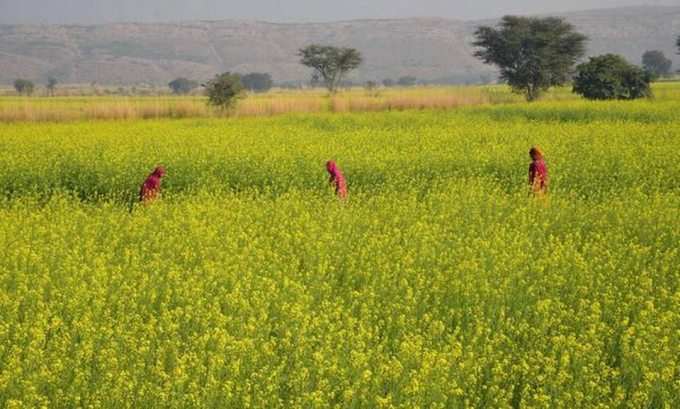June 17, 2025 | 19:17 GMT +7
June 17, 2025 | 19:17 GMT +7
Hotline: 0913.378.918
June 17, 2025 | 19:17 GMT +7
Hotline: 0913.378.918

Chief Minister Ashok Gehlot, who reviewed the availability of fertilizers here on Tuesday, said he had drawn Prime Minister Narendra Modi’s attention in a letter about the difficulties being faced by farmers. Photo: Hindu Times
The next couple of weeks will be closely watched for cases of paddy stubble burning in Punjab and Haryana, that have mercifully been lower in number so far. But they will also matter for the availability of fertilisers to farmers across India. As reported by this newspaper, stocks of all nutrients, particularly di-ammonium phosphate (DAP) and muriate of potash (MOP), are at precariously low levels. Viral videos of farmers even looting fertiliser bags from trucks, including in the Union Agriculture Minister’s constituency, mirror the desperation. Plantings of wheat, mustard, chana, masoor, potato, onion and other rabi crops are about to commence, if they haven’t already. Soil moisture conditions are also most conducive, thanks to the surplus rains since September. Shortages of fertiliser — more so DAP, required right at the time of sowing — can be a dampener in such a situation. And with state elections ahead in Uttar Pradesh, Punjab and Uttarakhand, they can prove politically costly too.
The Narendra Modi government will have its work cut out in the coming days managing supplies and, possibly, farmer anger. It should have raised the subsidy on non-urea fertilisers in time for the industry to plan imports. Given spiraling global prices — of fertilisers as well as inputs such as phosphoric acid, ammonia and sulphur — imports were viable only if companies could pass these on to farmers here. The government acted when they did; retail prices went up from Rs 24,000 to Rs 34,000 per tonne for some complex fertilisers. On October 12, it approved a substantial hike in the subsidy on DAP and three popular complexes. This decision ideally should have come much earlier to enable building of sufficient opening stocks for the rabi season. But now that imports can happen, the government must ensure that the material is moved quickly from the ports to the consumption centres. Once farmers are assured of enough stock in transit, the panic buying will stop and they may not mind even delaying sowing by a week.
The government should also use the current supply crisis to wean away farmers from applying too much high-analysis fertilisers. Urea and DAP contain 46 per cent nitrogen (N) and phosphorus (P), respectively, while MOP has 60 per cent potassium (K). Why not replace them with NPK complexes such as 12:32:16 and 10:26:26, or single super phosphate having 16 per cent P and 11 per cent sulphur? Farmers need to know that India imports much of its fertiliser raw materials. These can be used for products delivering the same nutrients in just the required quantities, including in water-soluble form or even foliar application like IFFCO’s Nano Urea. This crisis shouldn’t be wasted: Bring urea under nutrient-based subsidy and let farmers think beyond DAP and MOP.
Sowing of rabi crops adversely affected in 50-lakh hectare area
Rajasthan continues to reel under an acute shortage of diammonium phosphate (DAP) fertilizer, which has adversely affected the sowing of rabi crops, especially mustard and gram, in an estimated 50-lakh hectare area. The State government has made a request to the Centre to make available 1.10 lakh tonnes of DAP during October.
Chief Minister Ashok Gehlot, who reviewed the availability of fertilizers here on Tuesday, said he had drawn Prime Minister Narendra Modi’s attention in a letter about the difficulties being faced by farmers.
Farmers queuing up at the dealers’ shops and the Kraya Vikraya Sahakari Samiti offices are not getting the DAP even after waiting for long hours mainly in Bharatpur, Sawai Madhopur, Tonk, Dholpur and Karauli districts, where mustard is grown.
Mr. Gehlot said continuous efforts were being made to improve the fertilizer supply, but there was a shortage all over the country and the DAP was supplied only by the Union Government. Against the demand for 1.50 lakh metric tonnes in the State in October, 68,000 metric tonnes has been approved by the Centre. Of that, only 60,000 metric tonnes have been received so far.
Alternate phosphatic fertilizers
Mr. Gehlot said Union Minister of Chemicals and Fertilizers Mansukh Mandavia had also been requested to increase the DAP supply. Besides, the farmers have been asked to use the alternate phosphatic fertilizers — single super phosphate (SSP) and nitrogen, phosphorus and potassium (NPK) compound — to avoid the possible losses because of shortage of DAP.
As the State has received six rakes of DAP and 3.5 rakes of NPK during the last six days, the farmers have got a partial relief. The demand for DAP is increasing again because of post-monsoon rains in several parts of the State during the last few days.
(Indianexpress)

(VAN) Extensive licensing requirements raise concerns about intellectual property theft.

(VAN) As of Friday, a salmonella outbreak linked to a California egg producer had sickened at least 79 people. Of the infected people, 21 hospitalizations were reported, U.S. health officials said.

(VAN) With the war ongoing, many Ukrainian farmers and rural farming families face limited access to their land due to mines and lack the financial resources to purchase needed agricultural inputs.

(VAN) Vikas Rambal has quietly built a $5 billion business empire in manufacturing, property and solar, and catapulted onto the Rich List.

(VAN) Available cropland now at less than five percent, according to latest geospatial assessment from FAO and UNOSAT.

(VAN) Alt Carbon has raised $12 million in a seed round as it plans to scale its carbon dioxide removal work in the South Asian nation.

(VAN) Attempts to bring down the price of the Japanese staple have had little effect amid a cost-of-living crisis.